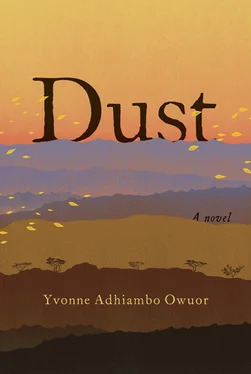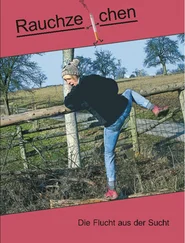“For the father of your nation.” The red-eyed glare of a big-faced man in a photograph, blurred when seen through Nyipir’s tears as he contemplated giving his life over to a person who growled nyoko nyoko as he invaded even his citizens’ inner spaces. So this was nationhood? A body freed from ordeal, a soul that would have to take care of itself. Nyipir nodded yes. He had opened his mouth to confirm his assent, but his voice screamed, Aloys Kamau , and afterward he could not speak.
The past is a trance.
Ajany watches fresh crevices reshape the hollows of her father’s face. Tears fill them. The overflow pierces her eyes.
“Nyara …” Nyipir entreats, “don’t cry.… You can see, your baba is alive.”
True.
Nyipir had lived.
Nine months later, Petrus Keah had arranged Nyipir’s escape. He then commanded Nyipir: Live. Forget. The past’s behind you . Nyipir had asked, How? Petrus had said, You’re a man, you’ll know what to do . Nyipir had said nothing. Petrus had asked, So, who’s this Aloys Kamau? And Nyipir said, A catechist. He was murdered . Petrus said, You’d sacrifice your life for a dead preacher? Nyipir had stared back, numb. Petrus had lit a cigarette, given it to Nyipir, who inhaled deeply. When he gave the cigarette back to Petrus, the smoke formed an arc between them. Nyipir told Petrus that he used to collect shriveled human testicles and clean up brain matter. He told Petrus that Aloys’s blood and its story were written in silence. Petrus had told Nyipir, You are mad . Then he added, Kenya will survive us . Before Nyipir could reply, Petrus added, Amnesia is also medicine . Then he told Nyipir, Run . So Nyipir ran. He ran and thought about forgetfulness, and how to create it.
On an early morning after the night of a distant day, Aggrey Nyipir Oganda had lurched into Wuoth Ogik. He had shimmered like a Nilotic ghoul. When he crossed into the courtyard, he fell to the ground. Galgalu had found him, and he had screamed for Akai to hurry.
At home in Wuoth Ogik, Nyipir had sat near a fire made near the cattle enclosure, watching day become night. Akai had waited by his side, needing him to speak. He couldn’t. Galgalu had scattered healing resin into the fire every hour.
A slow season during which the outside of Nyipir knit together again. A month later, at sunset, Akai led him back into the coral house. In their room, he clung to her. Afraid of secret things. Every night, he touched the curves of his wife’s body, the places he longed to know and fill again. Every night, he understood a little more that all he could do was hold her to his body. He then watched as every night shifted her body to the edge of their bed. Their quiet tears. And he could do nothing.
His hands became stronger. He practiced writing by spelling out the names of those he had seen, some of whom he had known, the ones who had once called out to him, saying, Tell my wife, brother, son, daughter, father, mother, friend .…
He kept those names until the afternoon he met the Trader.
Desperate, three months later, Nyipir had gone out to find the man who, it was said, could return a human being to something of life. While transacting a liturgy, Nyipir had given the Trader the names. In exchange, the Trader talked to the network of people who would ensure that the name Aggrey Nyipir Oganda would be expunged from official records. When the name had been erased, Nyipir restarted his life.
Chirping birds, warm wind. Nyipir is shivering. Ajany examines the light-shadows around him, sometimes brightening his body, sometimes coloring it.
Nyipir tries to explain the country to his daughter. He stumbles. How to say, We’ve been at war since before your birth , when the nature of this war has been its silence?
Invisibility, a perfect camouflage for truth.
Citizens blind and deaf even when they saw neighbors being hauled away, howling. Some buried bodies of mysteriously smashed-up relatives, and addressed their anguish in riddles that only archangels might decipher. Provincial officers and chiefs passed decrees in village after village: From now on, we shall not speak of so-and-so again. Anybody who mentions this name is an enemy of our nation . Afterward, nobody was even willing to admit that so-and-so had ever existed.
For the sake of peace.
And if I speak, may the oath kill me .
A habit that spread across the nation.
A stark blue sky.
“Will it rain?” Ajany asks, squinting. “Odidi once told me,” she says, “that volcanoes explode out of the earth to shake off men’s buried deeds.”
Nyipir snorts a laugh.
Ajany says, “His blood was a patch on the black road.”
Nyipir listens.
“I touched it. Washed it.”
Quiet.
For an intense moment, coiling infernal rage. Shared bloodthirst. Then, all of a sudden, with a guttural exhale, Nyipir grunts, “Forgive.”
He twitches, also startled by the word. Hears its echo again and understands that he wills a kinder life for his child; he will sunder her from dereliction.
Her whisper. “Forget?” Ajany stares at her father, her body trembling in disbelief.
A thought. No .
They wait.
“Forgive.” His voice wilts. The burden of this choice. He arches his back. Restless, sweating, swearing, wrestling in silence. But his daughter will not bear this haunting, she will not live her brother’s suffering.
Forgive . He does not say it aloud this time because of an image that entangles him: Odidi.
I will carry you . A promise to his dead. Alone .
Image.
His son’s body disintegrating under the weight of clay, of stones. Nyipir reaches forward and scoops hard, hot, brown-red soil. Squeezes it in his hand. It crumbles. Dust.
ISAIAH STUMBLES OVER A CAMEL’S SKELETON. IN THE SKY, A dark cloud marches southward. Ahead, a single weaverbird waits in a laden acacia. He picks himself up, pissed off — not at falling, but at a hideous desire to return to that woman, to purge an unreacheable wound, and also to be held on to while he howled.
All of a sudden he hears his name being called: “Isaiaaaah!”
Malaria hallucinations? Now I’m going crazy .
The sound mirage becomes Ali Dida Hada.
Later, next to a cluster of mature, flowering milkweed bushes, they stare at the southern sky.
“Maybe it will rain,” Ali Dida Hada says.
Isaiah is surprised. “It rains? Here?”
Ali Dida Hada nods. “Sometimes. Where’re you going?”
“Don’t know.”
“No destination?”
Isaiah says, “Nope.” Then, “Your advice?”
Ali Dida Hada gesticulates. “About what?”
“My father.”
Quiet.
Then, “You want to reopen the case?”
Isaiah wipes his forehead. An exhalation: “Don’t know.”
Ali Dida Hada says, “Me, I’m looking for a woman.”
“Good luck,” mutters Isaiah.
“Come with me.”
“Why?”
“She has answers. Maybe for you, too.”
Roaming.
It was something to do.
Isaiah turns.
They walk the rest of the night, until dawn unveils a kingdom of cairns, one with a headstone, ring graves, stone-encrusted spots. Stepping on ancestral bones and ancient fishes. Blend of heat and scenery encircled by waltzing shadows. In between, scraps of bush, mountains, and dik-diks.
Ali Dida Hada examines the frugal ground.
Isaiah asks, “Where are we?”
“Not so far from Sibiloi.”
Isaiah dredges up images of water, while above, egrets fly in formation on a detour to the Kokoi watering hole. Later, bent-over, ramshackle cottages.
Читать дальше











